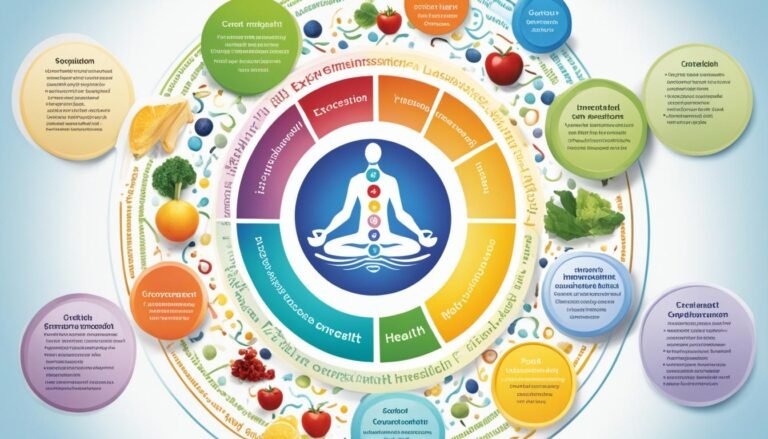How can I make my life a good life?
Do you often find yourself wondering how to make your life a good life? Are you searching for practical steps to improve your personal world? You’re not alone. Many of us strive to create a happier and more fulfilling life, one that is filled with joy, purpose, and positive experiences. The good news is that you have the power to shape your own destiny and make life truly amazing. By taking intentional actions and making conscious choices, you can transform your life into something extraordinary.
Improving your personal world starts with an inward focus. It involves nurturing your mental and emotional well-being, taking care of yourself, and cultivating strong relationships. It also means making positive changes in your daily habits and routines to enhance your overall well-being. By following these practical steps and incorporating them into your life, you can create a life that is truly good.
Key Takeaways:
- Improving your personal world is within your control.
- Focusing on mental and emotional health is essential for a good life.
- Eating nourishing food and getting proper sleep contribute to overall well-being.
- Surrounding yourself with positive people and avoiding news overload can promote positivity.
- Regular exercise, pursuing meaningful activities, and practicing kindness are key to a good life.
Balance Your Mental and Emotional Health
When it comes to making life a good life, one of the most important aspects to focus on is the balance of your mental and emotional health. Taking care of yourself and prioritizing your well-being allow you to experience greater happiness and overall life satisfaction. By maintaining a healthy mindset and emotional well-being, you can navigate life’s challenges with resilience and grace.
To achieve balance in your mental and emotional health, it is essential to manage stress levels and seek support when needed. Stress can have a significant impact on your well-being, affecting both your mental and physical health. By adopting stress management techniques such as meditation, deep breathing exercises, or engaging in activities you enjoy, you can reduce stress and maintain a sense of balance.
Seeking support from friends, family, or professionals can also be beneficial. Talking about your feelings and concerns with someone you trust can provide perspective and help you process difficult emotions. Additionally, if you find that your mental or emotional health is significantly impacting your daily life, seeking professional help from a therapist or counselor can provide valuable guidance and support.
Remember, your mental and emotional well-being are just as important as your physical health. Take the time to prioritize self-care and establish healthy coping mechanisms. By balancing your mental and emotional health, you can create a foundation for a good life filled with joy and fulfillment.
Table: Tips for Balancing Mental and Emotional Health
| Tips | Benefits |
|---|---|
| Practice self-care activities such as meditation, journaling, or hobbies | Reduces stress, promotes relaxation, and enhances overall well-being |
| Seek support from friends, family, or professionals | Provides a safe space to express emotions, gain perspective, and receive guidance |
| Engage in regular physical exercise | Boosts mood, reduces anxiety and depression, and increases energy levels |
| Set boundaries and prioritize self-care | Prevents burnout, fosters healthy relationships, and enhances overall life satisfaction |
By incorporating these tips into your daily routine, you can take meaningful steps towards achieving a balanced mental and emotional state. Remember, it is a continuous journey, and it’s okay to ask for help along the way. Focus on nurturing your mental and emotional health, and you will be well on your way to creating a good life.
Eat Nourishing Food
Maintaining a healthy diet is essential for optimal energy levels and overall well-being. By consuming nourishing and nutrient-rich foods, we can fuel our bodies and promote a good life. Including a variety of foods from all food groups ensures that we receive the necessary vitamins, minerals, and antioxidants to support our physical and mental health.
A healthy diet consists of fruits, vegetables, lean proteins, low-fat dairy products, and whole grains. These food groups provide essential nutrients that contribute to sustained energy throughout the day. For example, incorporating dark leafy greens, such as spinach and kale, into our meals can boost our intake of vitamins and minerals while also providing a source of fiber for digestion.
Additionally, carrots, broccoli, and other colorful vegetables offer a range of antioxidants that help protect our cells from damage caused by free radicals. Choosing lean proteins, such as chicken, fish, or tofu, provides essential amino acids for muscle repair and growth. Including low-fat dairy products and whole grains, such as yogurt and quinoa, can further enhance our diet by providing calcium, healthy fats, and complex carbohydrates for sustained energy.
| Food Group | Examples |
|---|---|
| Fruits | Berries, bananas, oranges |
| Vegetables | Broccoli, carrots, spinach |
| Lean Proteins | Chicken, fish, tofu |
| Low-Fat Dairy | Yogurt, milk, cheese |
| Whole Grains | Quinoa, brown rice, whole wheat bread |
By incorporating these nourishing foods into our daily meals, we can enjoy sustained energy and promote overall well-being. Remember, a healthy diet is not about restriction or deprivation but rather about making informed choices and finding a balance that works for our individual needs and preferences. So let’s prioritize nourishing food and take a step towards creating a good life filled with vitality and optimal energy.

Quotable
“Let food be thy medicine and medicine be thy food.” – Hippocrates
Sleep Seven to Eight Hours Per Night
Prioritizing quality sleep is crucial for maintaining high energy levels and overall health. Most adults require seven to eight hours of sleep per night for optimal functioning. Establishing a consistent bedtime routine, creating a conducive sleep environment, managing stress, and minimizing exposure to electronic devices can all contribute to improved sleep quality and increased energy levels.
Adequate sleep is essential for the body and mind to recharge and rejuvenate. It allows the brain to process information, consolidate memories, and restore cognitive function. Quality sleep also plays a vital role in regulating hormones, boosting the immune system, and supporting overall physical well-being.
To prioritize sleep, it is important to establish a consistent sleep schedule. Going to bed and waking up at the same time every day helps regulate the body’s internal clock and promotes better sleep quality. Creating a comfortable sleep environment by keeping the room cool, dark, and quiet can enhance the overall sleep experience. Additionally, engaging in relaxation techniques, such as deep breathing exercises or meditation, can help calm the mind and prepare the body for sleep.
| Benefits of Quality Sleep | Consequences of Sleep Deprivation |
|---|---|
| – Increased energy levels | – Reduced cognitive function |
| – Improved mood and mental well-being | – Impaired decision-making abilities |
| – Enhanced memory and learning | – Weakened immune system |
| – Better stress management | – Increased risk of chronic conditions, such as obesity, diabetes, and cardiovascular disease |
“Sleep is the best meditation.” – Dalai Lama
Prioritizing Sleep for Optimal Well-being
When it comes to maintaining high energy levels and overall well-being, prioritizing sleep should be a top consideration. By ensuring that you get seven to eight hours of quality sleep each night, you can reap the numerous benefits that come with a well-rested body and mind. So make it a priority to establish a consistent sleep routine, create a sleep-friendly environment, and develop healthy sleep habits. Your body and mind will thank you for it.
Keep Company with Good People
I firmly believe that the relationships we cultivate can greatly impact our overall well-being. Surrounding myself with positive and like-minded individuals has been instrumental in creating a good life for myself. When we select company that radiates positivity and shares similar interests, it can significantly enhance our energy levels and bring a sense of excitement and fulfillment to our daily lives.
Building strong and positive relationships is a two-way street. It requires investing time and effort into nurturing connections that uplift and inspire us. By engaging with individuals who exude positive energy, we create a harmonious environment that supports personal growth and happiness.
“Surrounding myself with positive and like-minded individuals has been instrumental in creating a good life for myself.”
Creating Boundaries
However, it is important to set boundaries and be selective about the people we allow into our lives. Interactions with negative individuals or those who drain our energy reserves can have a detrimental impact on our well-being. Therefore, it’s essential to choose our company wisely and be mindful of the energy exchange that takes place within our relationships.
By keeping company with good people, we not only benefit from their positive influence but also contribute to the creation of a supportive and nurturing community. Together, we can uplift and inspire each other, creating an environment that fosters personal growth and the pursuit of a good life.
When we surround ourselves with positive influences and cultivate meaningful relationships, we can experience greater joy, fulfillment, and positive energy in our lives. So, let’s choose our company wisely and create a network of individuals who uplift and inspire us on our journey towards a good life.
Avoid News Overdose
In today’s digital age, news consumption has become a constant part of our lives. While staying informed is important, it’s crucial to recognize the impact excessive news consumption can have on our mental and emotional well-being. Constant exposure to distressing stories and negative information can lead to heightened anxiety, stress, and a pessimistic outlook. To maintain a positive mindset and cultivate a good life, it’s essential to minimize exposure to news and focus on recognizing the good in our surroundings.
Minimizing news exposure doesn’t mean being uninformed. It means being selective about the sources and amount of news we consume. Instead of engaging with news updates throughout the day, consider setting designated times to catch up on the latest headlines. Limiting exposure to news during challenging times can help protect our mental and emotional health, allowing us to focus on positive aspects of our lives and maintain a more optimistic outlook.
“I have found that by consciously limiting my exposure to news, I am able to maintain a positive outlook and focus on the things that truly matter in my life. It’s liberating to disconnect from the constant stream of information and prioritize my mental well-being.”
By minimizing news consumption and reducing exposure to negative information, we can create space for positivity and maintain a healthier mindset. Instead of getting caught up in the cycle of news, we can shift our attention to activities that bring joy, engage in meaningful conversations, and cultivate a sense of gratitude. Taking a step back from overwhelming news can allow us to foster a more balanced and fulfilling life, filled with moments of peace and positivity.

| Negative Effects of Excessive News Consumption | Benefits of Minimizing News Exposure |
|---|---|
| Heightened anxiety and stress levels | Reduced anxiety and improved mental well-being |
| Negative outlook and pessimistic mindset | Positive mindset and increased optimism |
| Overwhelming feelings of helplessness and despair | Greater sense of control and empowerment |
| Increased focus on negative aspects of life | Enhanced appreciation for positive aspects of life |
Embracing a more intentional approach to news consumption can empower us to lead more balanced lives and maintain a positive outlook. By choosing what information we expose ourselves to and focusing on the good in our surroundings, we can create a foundation for a happier, healthier, and more fulfilling life.
Get Regular Exercise
Physical activity is a key component of maintaining a good life. Engaging in regular exercise not only helps relieve stress but also improves endurance and overall well-being. By incorporating physical activity into your daily routine, you can experience a significant boost in energy levels and enhance your physical and mental health.
Whether it’s going for a brisk walk, practicing yoga, or hitting the gym, finding an exercise routine that suits your preferences and fits into your schedule is essential. Regular exercise releases endorphins, which are natural mood boosters that promote a positive mindset. It also increases blood flow and oxygenation to the brain, enhancing cognitive function and focus.
To make exercise a consistent part of your lifestyle, set realistic goals and start with small steps. Gradually increase the intensity and duration of your workouts as you build endurance and confidence. Remember to listen to your body and give yourself rest and recovery days to prevent burnout and injury.
Benefits of Regular Exercise:
- Stress relief and improved mood
- Increased endurance and strength
- Enhanced cognitive function and focus
- Improved cardiovascular health
- Weight management and muscle toning
- Increased energy levels and productivity
Regular exercise not only improves physical health but also contributes to a sense of accomplishment and overall well-being. Make it a priority to incorporate physical activity into your daily routine, and you’ll reap the benefits of a more energized and fulfilling life.

| Activity | Duration | Energy Burned |
|---|---|---|
| Brisk Walking | 30 minutes | 150 calories |
| Cycling | 1 hour | 400 calories |
| Yoga | 1 hour | 200 calories |
| Strength Training | 45 minutes | 300 calories |
Do Something Meaningful Each Day
Living a good life involves finding activities that bring joy and purpose to each day. It’s important to pursue passions and utilize talents in meaningful ways. By engaging in activities that align with our interests and strengths, we can experience a sense of fulfillment and happiness.
Whether it’s practicing a musical instrument, painting, or volunteering for a cause we care about, investing in self-care and doing something enjoyable each day contributes to our overall well-being. These activities not only provide a sense of accomplishment but also help conserve our energy and bring out the best in ourselves.

When we prioritize doing something meaningful each day, we are making a conscious effort to take care of ourselves and nurture our passions. It’s important to carve out time for activities that bring us joy, as they can have a positive impact on our mental and emotional well-being.
Finding Your Passion and Utilizing Your Talent
Identifying our passions and talents is the first step towards incorporating meaningful activities into our daily lives. Reflecting on our interests, hobbies, and the things that make us feel alive can help us discover our true passion. Additionally, recognizing our unique talents and strengths enables us to utilize them in ways that bring value to ourselves and others.
“The purpose of life is not to be happy. It is to be useful, to be honorable, to be compassionate, to have it make some difference that you have lived and lived well.” – Ralph Waldo Emerson
Embracing this philosophy can guide us towards finding meaningful activities and pursuing a life that is not only personally fulfilling but also contributes to the well-being of others. When we engage in activities that align with our passions and utilize our talents, we tap into a source of energy and motivation that fuels our journey towards a good life.
Self-Care and Personal Well-Being
Engaging in meaningful activities is an essential form of self-care. It allows us to recharge, rejuvenate, and foster a positive mindset. Taking time for ourselves and doing something that brings us joy can help reduce stress, improve our mental health, and enhance our overall well-being.
As we prioritize self-care through meaningful activities, we not only improve our own lives but also become a positive influence on those around us. Our energy and enthusiasm are contagious, and when we lead by example, we inspire others to pursue their own passions and make their lives good lives as well.
Think Good Thoughts for Others
In order to create a good life, it is important to cultivate a positive mindset and extend kindness to others. Practicing compassion and offering kind attention to those around us not only benefits them but also contributes to our own well-being. By directing our thoughts towards goodwill and positivity, we can conserve our energy and promote a harmonious and uplifting environment.
When we make a conscious effort to think good thoughts for others, we shift our focus from judgment and criticism to understanding and empathy. This helps us develop a broader perspective and allows us to see the world through a more optimistic lens. By acting with kindness and compassion, we can create a ripple effect of positivity that has the power to transform not only our own lives but also the lives of those around us.
“Kindness is a language that the deaf can hear and the blind can see.” – Mark Twain
By practicing kind attention, we become more attuned to the needs and experiences of others. This can be as simple as offering a listening ear, a genuine smile, or a helping hand. When we approach interactions with kindness and respect, we foster deep connections and create a sense of belonging. This not only enriches our own lives but also strengthens the social fabric of our communities.
| Benefits of Thinking Good Thoughts for Others | Ways to Practice Compassion and Kindness |
|---|---|
|
|
By making a conscious effort to think good thoughts for others and practicing compassion and kind attention, we not only contribute to the well-being of those around us but also create a positive and nurturing environment for ourselves. Let us cultivate a mindset of goodwill and empathy, knowing that every kind thought and action has the power to make a difference in the lives of others and ultimately, in our own pursuit of a good life.
Monitor Your Energy and Make Incremental Changes
When striving to make life a good life, it’s crucial to be aware of our energy levels and how they impact our overall well-being. By monitoring our energy throughout the day, we can identify patterns, triggers, and areas where our energy is being drained. This self-awareness allows us to make incremental changes that can lead to personal growth and a more fulfilling life.
Self-awareness is the key to understanding how our energy levels fluctuate throughout the day. By paying attention to when we feel most energized and productive, we can plan our activities accordingly. For example, if I notice that my energy tends to dip in the afternoon, I can schedule less demanding tasks during that time and save more challenging or creative work for when I know I’m at my best.
It’s important to remember that making incremental changes doesn’t mean completely overhauling our lives overnight. Instead, it involves taking small, sustainable steps towards improving our energy management. This could be as simple as incorporating short breaks or relaxation techniques into our daily routine, or reevaluating our priorities and letting go of activities that no longer serve us.
By making these incremental changes, we can optimize our energy levels and create a more balanced and fulfilling life. It’s a journey of self-discovery and growth, where we learn to listen to our bodies and make choices that align with our physical, mental, and emotional well-being.
Table: Energy-Boosting Activities
| Activity | Description |
|---|---|
| Morning Meditation | Start the day with a short meditation to calm the mind and increase energy levels. |
| Physical Exercise | Engage in regular physical activity to boost endorphin levels and enhance overall energy. |
| Hydration | Drink plenty of water throughout the day to stay hydrated and maintain optimal energy levels. |
| Healthy Snacks | Choose nutrient-dense snacks, such as fruits, nuts, and yogurt, to provide sustained energy. |
| Mindful Breaks | Take short breaks throughout the day to recharge and refocus your energy. |
Remember, personal growth and a good life are achieved through mindful attention to our energy levels and making small, intentional changes. By staying self-aware and adapting our routines and choices accordingly, we can optimize our energy and create a life that is truly fulfilling.
Plan and Prioritize
Managing energy effectively is essential for maximizing productivity and achieving goals. By planning and prioritizing tasks according to energy levels, individuals can optimize their time and productivity, leading to greater success and fulfillment.
When it comes to energy management, it’s important to recognize the times of day when energy levels are highest. For many individuals, this is typically in the morning or early afternoon. During these peak energy periods, it’s ideal to tackle important and challenging tasks that require focus and concentration. By leveraging high energy moments, one can ensure that critical tasks are completed efficiently and effectively.
On the other hand, it’s equally important to recognize times of the day when energy levels tend to dip. During these periods, it can be beneficial to focus on less demanding tasks or activities that require less mental exertion. This allows for rest and recovery, preventing burnout and maintaining a sustainable level of productivity throughout the day.
Goal setting is also a powerful tool for effective energy management. By setting clear and attainable goals, individuals can align their actions with their objectives, ensuring that energy is directed towards tasks that contribute to meaningful progress. Breaking down larger goals into smaller, manageable tasks can provide a sense of accomplishment and motivation, further fueling productivity.
Benefits of Effective Energy Management:
- Increased productivity and efficiency
- Improved focus and concentration
- Prevention of burnout and exhaustion
- Enhanced work-life balance
- Greater satisfaction and fulfillment
By planning and prioritizing tasks according to energy levels and setting clear goals, individuals can optimize their energy management and achieve greater productivity and success. This intentional approach to energy management not only maximizes output but also ensures a balanced and fulfilling life.
Conclusion
After exploring various aspects of living a good life, I have come to realize that it all starts with prioritizing personal well-being. By taking practical steps to balance mental and emotional health, nourish our bodies with wholesome food, and get enough quality sleep, we lay a strong foundation for a happier and more fulfilling life.
But it doesn’t end there. Surrounding ourselves with positive influences, engaging in meaningful activities, and practicing kindness towards others are all essential ingredients in our journey towards a good life. These actions not only conserve our energy but also contribute to a positive mindset and stronger relationships.
As I conclude this article, I leave you with the reminder that creating a good life is within your reach. By practicing self-awareness, setting goals, and making incremental changes in your daily routines, you can optimize your time and energy for greater success and fulfillment. So, go forth with confidence and embrace the power of intentional choices. Here’s to living a good life!
FAQ
How can I make my life a good life?
To make life a good life, you can focus on improving your personal world through practical steps and actions that lead to a happier and more fulfilling life.
How do I balance my mental and emotional health?
You can prioritize and balance your mental and emotional health by taking care of yourself, managing stress levels, and seeking support when needed.
What should I eat for optimal energy?
You should consume a well-balanced and healthy diet that includes a variety of foods from all food groups, such as fruits, vegetables, lean proteins, low-fat dairy, and whole grains.
How much sleep should I prioritize for increased energy levels?
Most adults require seven to eight hours of sleep per night for optimal functioning and maintaining high energy levels.
How can I surround myself with positive people?
Building strong relationships with positive and like-minded individuals who uplift you and share similar interests can greatly contribute to a good life.
Should I minimize exposure to news?
Yes, consuming excessive news can negatively impact your view of the world and overall well-being. Minimizing exposure to news, especially during challenging times, can help maintain a positive outlook.
How can regular exercise boost my energy levels?
Engaging in regular exercise can provide stress relief, physical strength, and increased energy levels, ultimately promoting better health and emotional well-being.
What can I do to find joy and purpose in life?
By pursuing passions and engaging in activities that bring you joy and fulfillment, you can enhance your overall well-being and make life a good life.
How can thinking good thoughts for others promote positivity?
Maintaining a compassionate mindset and practicing kind attention towards others can conserve energy, promote positivity, and prevent negative self-talk and internal exhaustion.
How do I monitor my energy levels for personal growth?
Being aware of your energy levels and identifying the factors that impact them is essential for personal growth. Monitoring energy levels throughout the day can lead to improved overall well-being.
How can I optimize my time and energy for greater success?
Planning and prioritizing tasks according to your energy levels, setting goals, establishing routines, and prioritizing essential tasks can optimize your time and energy for greater success and fulfillment.






